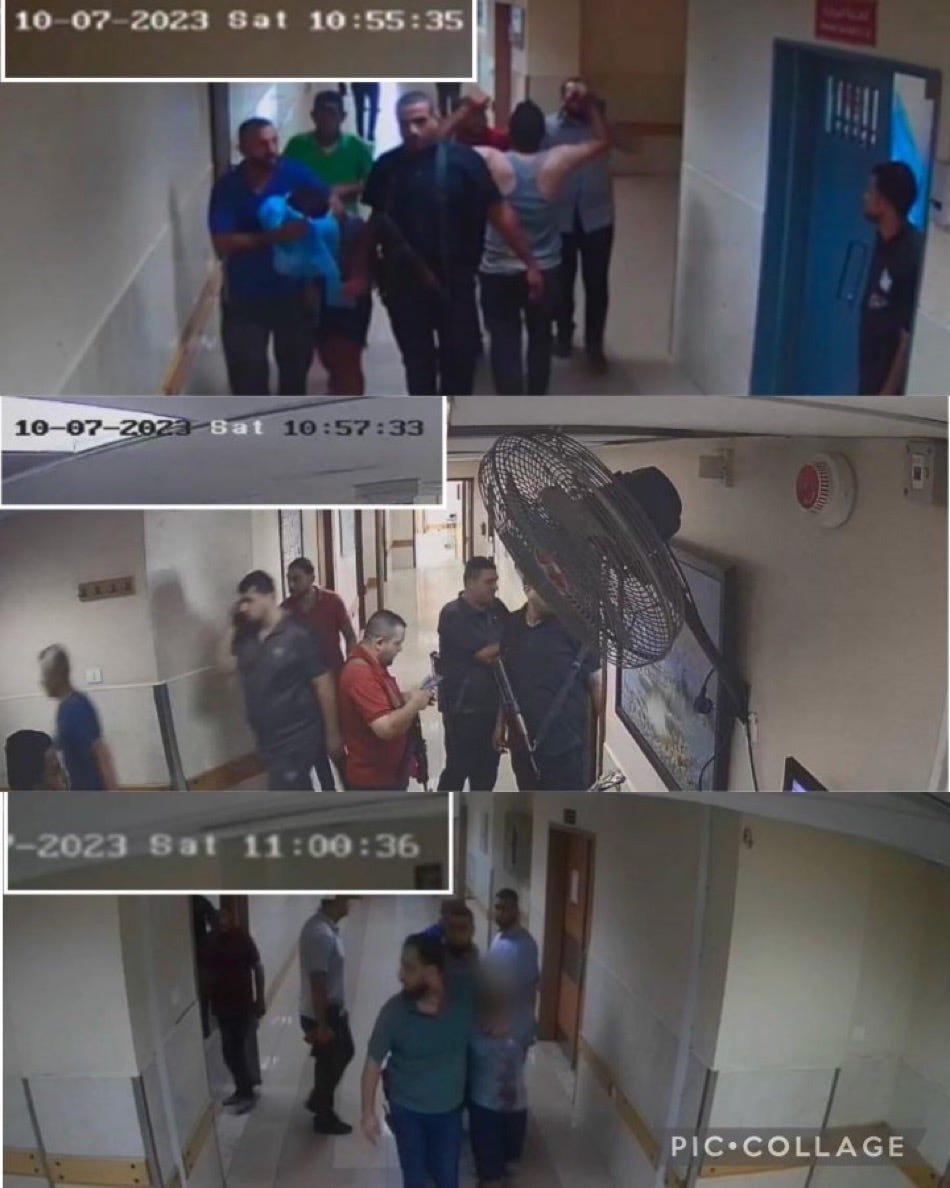DAY 44 OF THE GAZA WAR:13 Soldiers are killed in 2 days, Shifa Hospital Secrets Emerge,Houthis Hijack a Ship
Tel Aviv Diary November 20, 2023
Today was another difficult day for Israel. The names of an additional seven soldiers killed over the last two days were released this morning, bringing the total to 13 soldiers killed in the IDF take over of Zeitoun and Jabaliya. Every night, a significant part of the news is devoted to telling the story of each soldier who gave their life. Eulogies from almost every funeral are broadcast, and the life story of every fallen soldier is shared with the whole country on TV and radio by friends and family. Israeli soldiers who fall in battle are never anonymous.
The army continues to make steady progress, though mournfully, the cost has been heavy. It's clear that, as opposed to earlier hopes that Hamas troops have been broken, this is not yet the case. Hamas is still fighting back
. Today, the army unveiled a significant tunnel under Gaza’s Shifa Hospital. IDF forces are still cautiously exploring the tunnel, as it is heavily booby-trapped.
The army spokesman reported tonight that IDF Cpl. Noa Marciano — the soldier whose body was discovered a few days ago, and whom Hamas reported was killed in an Israeli bombing — in fact, sustained non-life-threatening wounds from the blast. Pathologists confirmed that after the bombing, Marciano was taken to Shifa and killed. The IDF also presented security tapes from Shifa, showing Hamas terrorists shoving both a Nepali and Thai hostage into the hospital. The military also showed pictures of Hamas bringing an Israeli military vehicle that they captured into the hospital. The IDF is finally providing the “smoking guns” to prove that Shifa was indeed being used by Hamas for military purposes
.
So far, the IDF has captured 100 prisoners, who have all been taken back to Israel for interrogation, including a number who took part in the October 7th massacre.
Today was a particularly violent day on the Northern border. Hezbollah fired repeatedly on Israeli border communities with anti-tank weapons, mortars, and drones. A possible explanation for the current increased attacks is that today is a Shiite holiday — and this is how they celebrate. Hezbollah believes they have had major success by forcing Israelis to evacuate their border communities. What's not often mentioned is that an estimated as many as 150,000 Lebanese have been forced to flee northward to get away from the clashes. However, that does not make any difference to Hezbollah, who claims it “works for the good of the Lebanese people”.
Ben-Gvir continues to create trouble, despite Israel being in the midst of a war. The minister insists on moving forward with a law to impose the death penalty on terrorists. Leaving aside all the issues around whether Israel should impose the death penalty in any case, the idea of discussing the matter while Hamas is holding over 200 of our hostages is totally irresponsible. For Ben-Gvir, advancing this debate is more about scoring political points than concern for the fate of the hostages.
Last night, the Security Cabinet spent hours, until 4 AM, discussing the decision that was already made to allow two tankers of fuel a day into Gaza. At the end of the discussion, which of course approved entrance of the fuel (despite the opposition of ministers Smotrich, Ben Gvir, and Regev), Former Defense Minister Gantz questioned, for the record, why they had to waste hours on this issue in the middle of the war.
The Houthis in Yemen hijacked a ship they said was connected to Israel. The merchant ship, flying under a Bahamas Flag, and with an international crew was traveling between Turkey and India. An Israeli businessman does possess partial ownership of the ship. As this is an act of international piracy, something the US fights all the time, the expectation is that the US will deal with this incident instead of drawing Israel into it.
Once again, there are a number of stories that the parties are very close to reaching a deal for the release of at least 50 hostages. According to the rumors, the expected agreement is for the setting free of 50 hostages, women and children, in return for a five-day pause in fighting. So far, the deal is not final.
Some followup from last night's update…
First, I mentioned the article written by President Biden. I only heard about the article from last night’s Press Conference, when Netanyahu was asked about Biden's statement regarding the Palestinian Authority taking control of Gaza. In fact, Biden referred to a ‘revised’ Palestinian Authority. President Biden asserted:
As we strive for peace, Gaza and the West Bank should be reunited under a single governance structure, ultimately under a revitalized Palestinian Authority, as we all work toward a two-state solution.
Biden continued,
and while Israelis are still in shock and suffering the trauma of this attack, Hamas has promised that it will relentlessly try to repeat Oct. 7. It has said very clearly that it will not stop.
President Biden clearly believes in the two-state solution, not because they have a great deal of confidence that it can happen, but for the same reason that I believe in that option: there is no other potential solution. I have just come to the conclusion that there is no chance it will happen in my lifetime, though I hope it can happen during the lifetime of my grandchildren.
One of my closest high school friends, (whom I have not been in touch with recently) responded to last night's newsletter with a lengthy email. His views on the conflict have always been to the right of mine, and as I admitted to him, much of what he has been saying over the years about the Palestinians seems to have been proven correct. Michael is fluent in Arabic and has spent significant time in the Arab world.
Here’s Michael’s basic argument …
The biggest problem with Westerners analyzing Arabs is the same problem that George Kennan found in Westerners analyzing Soviet Communists and Nazi Germans—the cultural-linguistic barrier. First, said Kennan, it was important to hear, read and see what they were saying in the original. Second, it was important to overcome the American-British-Western aversion to believing what one’s own eyes and ears had discovered.
I love Arabic, and I do not hate Arabs, and I would not have spent so much time studying something I hated. But I discovered certain truths that most Westerners would rather not face. Surprisingly or not, this is especially true of liberal Jews, who believe in Tikkun Olam and perfectibility of everyone, who embrace (as you and I do) the Enlightenment etc.
Michael continued:
But I discovered that what so many Mizrahi Jews understood from growing up in Iran or Egypt or Syria or Iraq was largely true—the connections between the collective authoritarian culture, the endemic effect of tribalism, hatred of The Other and the feelings of individual repression and sometimes of self-loathing. (Incidentally, This is particularly strong among Palestinians, while, Egyptians, for example, have a stronger self-image and a more tolerant view of The Other.)
The Mizrahi Jews’ level of understanding was on the gut level, while I came to it intellectually and cerebrally.
He also pointed out one of the questions asked on the opinion poll by the Ramallah-based Arab World Research and Development that I did not include yesterday.
“Considering the ongoing events, do you feel a sense of pride as a Palestinians?”
94% answered “YES, to a great extent”. That feeling was almost the same in Gaza as in the West Bank. In other words they all felt good about what Hamas did.
Where we go with this information I do not know. We all seem to know what won’t work. Who knows what will?







I find Michael's perspective especially interesting. Being an Ashkenazi Jew (born in Eastern Europe and living in Western Europe) I share the classically liberal politics of other Ashkenazi. But Mizrahi seem to have some cultural memory of living among Arabs/Muslims that make them more right wing in Israel.
Thank you for your news and insights